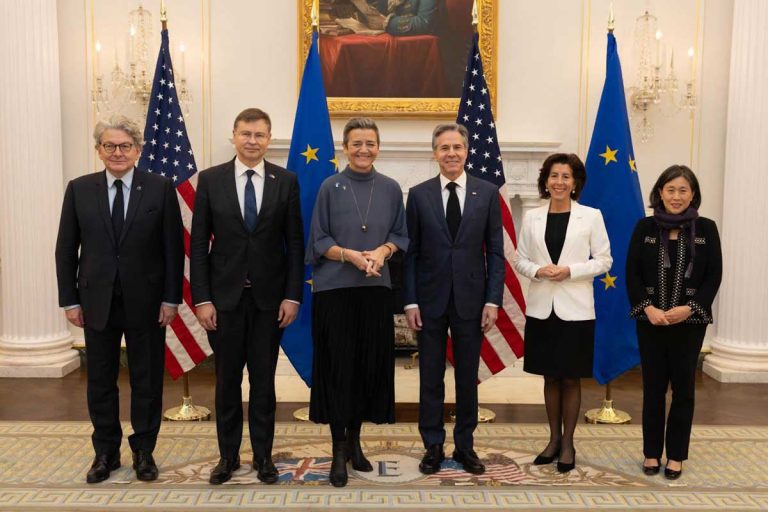Today marks the conclusion of the Technology and Trade Council (TTC) meeting in Washington, D.C., where the United States and the European Union reaffirmed their commitment to strengthening economic security and cooperation in critical and emerging technologies, prioritizing efforts to combat technology abuse, create resilient supply chains, and encourage innovation in Semiconductor industry.
The two parties stressed the need to enhance economic security, reduce dependence on critical technologies from authoritarian states, and enhance resilience in the face of turmoil.
Discussions focused on protecting technology from being misused to manipulate and interfere with foreign information, especially in the context of elections, disinformation campaigns and attacks on human rights defenders.
The United States and the European Union explored ways to cooperate in developing artificial intelligence, cybersecurity, and other critical technologies to ensure mutual progress and progress.
Strategies to enhance supply chain resilience were studied, including diversifying supply sources and investing in local production to mitigate disruptions.
The two parties discussed methods to encourage investment in semiconductor manufacturing and strengthen the semiconductor supply chain, while recognizing its importance.
The signing of the Joint US-EU Action Plan on Internet-Safe Products, which aims to create a secure transatlantic market for Internet-related products, was applauded.
The co-chairs agreed to reconvene the sixth TTC Ministerial Meeting in Belgium during the spring of 2024 to assess progress and identify new areas of cooperation.
Overall, the meeting demonstrated a productive exchange of ideas and commitments, and highlighted ongoing cooperation between the United States and the European Union in addressing trade and technology challenges. The signed Cybersecurity Action Plan and follow-up meeting planned for 2024 indicate a positive path for transatlantic cooperation in these critical areas.
The question arises: What will the TTC evolve into in the next year or five years? Personally, I believe there is no turning back, and the TTC must continue as a forum. The technological landscape has witnessed major transformations, accompanied by fundamental developments in policies and regulations. TTC is well positioned to address critical challenges at the intersection of commerce and technology.
The rapid pace of technological change, the emergence of new digital competitors, and an increasingly complex regulatory environment necessitate a collaborative approach to support open trade, encourage innovation, and protect security. In this age of digital competition, unity is crucial. We cannot simply return to the pre-TTC era under a Trump presidency; Such a step is neither possible nor desirable. Instead, we must move forward and prepare for the rapidly approaching future, taking into account China's rise in technological fields and profound changes in the international system.
On the geopolitical front, the Trump administration's withdrawal from the Trans-Pacific Partnership and its inaction on trade liberalization have likely provided China with an opportunity to establish leadership in setting rules and standards for trade and the economy, especially in emerging technologies such as artificial intelligence and digital trade.
I firmly believe that the TTC can become an indispensable forum. It remains to be seen whether the new administration is prepared to maintain or strengthen the TTC. However, building consensus among its members about the goals and objectives of the TTC is crucial. This would ensure that the TTC remains a valuable asset for all member states, regardless of their domestic political positions.
I have always called for the establishment of a permanent secretariat for the TTC. The Council should be viewed as a global forum to address trade and technology issues and advance multilateral interests. Establishing a permanent secretariat would provide continuity and expertise. Additionally, developing a strong public narrative about the benefits of TTC is critical for businesses, consumers, and policymakers.
The TTC should actively promote transatlantic values and interests by working to develop new rules and standards for trade and technology and enhancing cooperation on issues such as climate change and cybersecurity. Transparency and accountability are essential; Making the TTC more transparent and accountable will build trust in the Council and enhance its effectiveness in addressing trade and technology challenges.
Regular evaluation of the work of the TTC is essential to identify areas for improvement and ensure its continued relevance and effectiveness. This evaluation process must be transparent and involve stakeholders from all Member States. Evaluating the work of the TTC can contribute to building a more solid institution capable of meeting the challenges of political change.
The TTC has the potential to play a vital role in shaping the future of trade and technology, and the EU should be committed to making it successful. What does the TTC mean for Europeans? However, this does not mean a lower level of autonomy. In the current context of an aspirational Europe, the era of free riding is definitively over. Europeans must be more independent and exercise better control over their own destiny while cooperating with like-minded countries and formulating their strategies and visions of the world within an international system based on cooperation and multilateralism.
While the future of the TTC remains uncertain, there is a strong case for its continued existence and even enhancement. TTC can become a valuable asset in the face of challenges.

